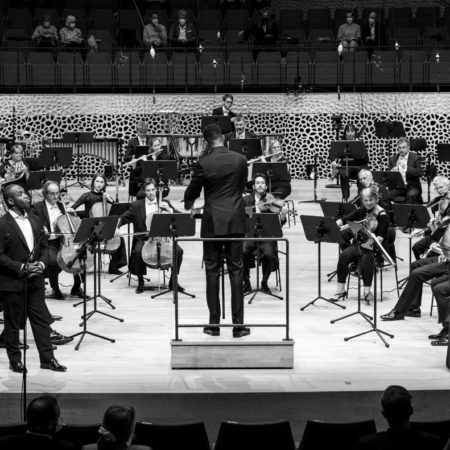Elbphilharmonie & Hamburg International Music Festival, June 2021
With his long-term project Song of America, Thomas Hampson wants to capture the whole history of American lieder. The latest chapter in his project is particularly interesting: “A Celebration of Black Music.”
Text by Bjørn Woll
Translated by Domenic DeSocio
For almost four decades, Thomas Hampson has performed the great baritone roles of Mozart and Verdi on almost all of the world’s important stages—in addition to Wagner and Strauss, peripheral works like Hindemith’s Mathis der Maler, and premieres such as Rufus Wainwright’s Hadrian. Yet there is something more dear than opera to the heart of this former student of the legendary lieder singer Elisabeth Schwarzopf: the art song, or lied. With an almost encyclopedic obsession, he and his longtime piano partner Wolfram Rieger have tended to the lieder of Mahler as well as the classics of Schubert, Schumann, and Wolf.
Born in 1955, the American “Ambassador of the Lied” has for years worked through the history of lieder in his homeland, shedding a light on its various facets in his series Song of America. As a singer and passionate teacher with a steadfast commitment to improving the world, he has striven to initiate a lively and critical engagement with this history. In 2003 he founded the Hampsong Foundation, which supports up-and-coming singers and research projects and organizes symposia and lecture concerts.
Hampson is now writing the next chapter in his Song of America series at the Hamburg International Music Festival: “A Celebration of Black Music.” This three-part festival-within-a-festival is dedicated to mostly forgotten African-American artists and is curated with the singer Louise Toppin, who at the University of Michigan has assiduously researched and published on the repertoire of African-American composers. “With regard to the lieder repertoire, I can only describe her as a walking encyclopedia,” Hampson rhapsodizes. They were able to win over the Georg Solti Award-winner Roderick Cox to conduct, one of the most interesting young conductors of his generation.
Interview with Thomas Hampson
Mr. Hampson, with “A Celebration of Black Music” you’re approaching the Black Lives Matter movement. What does this project mean to you?
Of course there is this current connection, but it is actually a continuation of my project “Song of America.” Like the previous chapters—”Wondrous Free” and “Beyond Liberty”—the title of this chapter clarifies its content. These programs are based on my deep conviction that classical music—and in particular the lieder repertoire—is always a witness of a culture or specific era. There is a wealth of poets and composers who can explain to us today what it was like to live back then.
Why are these topics so important to you?
Because we can use them to observe and reflect on our own history—through the eyes of our poets, and the ears of our composers. The rich repertoire of African-American composers has been completely neglected in this canon. We’re not talking about a few exceptions here but rather about a consistent artistic oeuvre that within American culture only seems to exist in a sort of parallel universe. When we talk about American music in the 1920s, for example, we talk about Copland and Barber, but at the same time great artists like William Grant Still, William Levi Dawson, and Florence B. Price were composing. That we’re not at all familiar with this other universe is a great historical injustice.
Do we have a false picture of music history because white culture has quite consciously ignored this part of history?
Absolutely! But with our festival we don’t want to engage in moral finger pointing. Rather, it’s about a critical examination of our own past through the tools of art. For example, William Dawson had great success in 1934 with his Negro Folk Symphony, he received standing ovations from a majority white audience—and that’s probably why his piece was consciously surpressed. We can clearly see the injustice that has been inflicted upon the African-American community in the United States by the ways in which its art and culture has been dealt with, even up until today. Even with people who champion African-American culture, you often get the impression that this culture has carved out a justified place next to actual American culture. I reject this perspective, as there’s only one shared American culture. We need to finally recognize that. With this festival I’d like to contribute to this shift.
You see this juxtaposition in the fact that Joseph Bologne, Chevalier de Saint-George, who was also Marie Antoinette’s violin teacher, was called the “Black Mozart” and that Samuel Coleridge-Taylor was known as the “Black Mahler”…
Exactly, these artists wrongly earned their reputations only through comparisons with white composers. We want to illustrate this too in the festival by, for example, bringing face to face works by William Grant Still, an important symphonic and song composer at the beginning of the twentieth century, and pieces by contemporaneous white American and European composers. In doing so, we are not making a value judgement. Rather, we’re celebrating the richness and reunion of this repertoire.
What view of this period do the works of African-American composers give us?
It is of the disenfranchised, that is to say, of outsiders. And at the same time a great pride speaks to us from these works, such as the poems of Langston Hughes, who became an icon of the American civil rights movement. He was proud of being Black and of his African heritage, which was older than America itself. Horrible things have happened in our past, and we must finally acknowledge this racism. Though “acknowledge” is too feeble a verb: we owe it to ourselves and our past, present, and future. As Americans we must recognize all of the racism and injustice in our heritage and use this knowledge to create a better future. “Man is an abyss,” Wozzeck sings in Alban Berg’s work, and I believe that the arts can help us be less abyss and more human.
Now, many Black jazz, hip-hop, and pop artists are ubiquitous and insanely successful. We can’t say the same for classical music. Is classical music more racist?
That is a legitimate question that today is being posed more and more frequently. I’ve experienced it myself in my career. During a performance of Le nozze di Figaro with the Black soprano Roberta Alexander, who played the Countess, we received threats. With my now European perspective on America, I’ve noticed that there are attempts to find answers to this problem, such as with symposia. On the other hand, although there is a human resources person at every American opera house responsible for issues of discrimination and equal opportunity, to the best of my knowledge none of them were themselves Black, at least before the BLM movement. These are delicate and uncomfortable questions that we nevertheless must ask. Why is classical music predominantly controlled by white people? It is a systemic problem that we can only solve if those making the decisions are more diverse. This is something that cannot be changed overnight, but we have to consequently and continuously tackle the problem. And that only happens if we change the way things work from the inside out.
Classical music does, then, have a racism problem?
I don’t know what opinions and feelings people have in their heads and in their hearts, but when we take a closer look at the institutions of classical music, we can see that Black artists are underrepresented both on stage and in all other areas of our field. That may be the result of conscious or unconscious bias or a lack of imagination. However, I would not say that racism is fundamental to classical music. I believe that it’s more subtle than that. It has something to do with societal developments, for example with access to quality education and thus with the opportunity to study at a university. Especially in America—and above all for people of color—it is a question of money, if one can afford a cultural education. In the United States it is difficult to discuss racism without also talking about economic injustice.
As a teacher, how do you see the issue of equal opportunity playing out among young artists?
Like I said, we first need to ensure that everyone who has sufficient talent and is prepared for this career does in fact get the chance to embark on it. Second, it’s about making sure that no hurdles due to origin or skin color stand in the way of those who have made it this far. One possibility would be having diverse contact people in human resource departments who would responsibly deal with these problems. More generally, we need a change in thinking among and a reshuffling of directors, higher education leaders, and conductors in order to find perspectives for problems that we as white people cannot understand.
Role models are especially important for young artists, idols toward which they can orient themselves. Are role models missing for today’s Black singers in comparison to the past, with the likes of Marian Anderson, Leontyne Price, George Shirley, or Jessye Norman?
I wouldn’t say that. They exist today. When I talk to young Black singers, they often mention Denyce Graves as a role model. But there are also role models among the younger generations themselves, such as Julia Bullock and Lawrence Brownlee or Pretty Yende and Angel Blue. I was supposed to do something with Porgy and Bess together with Angel. At first I had concerns about singing it as a white man. But she insisted and said, “But that’s exactly why you have to do it.” George Shirley, the first African-American tenor to sing lead parts at the Metropolitan Opera, has over the decades consistently held firm to the idea that it is more a question of content or style than of skin color. Of course role models are important, and many Black singers look back at their predecessors with pride. At the same time, we must offer another perspective, as many of my colleagues of color do not want to be appreciated for their skin color but rather for what they do. For example, in reviews you always read about a “singer of color”—why is that necessary? After all, no one would ever write about the “white Thomas Hampson.” Skin color and origin may be interesting, but they mustn’t become a preoccupation.
Recently, there has been controversy about blackface, that is, actors painting themselves dark for roles like Othello or Aida. How important or even helpful are such discussions in changing things?
We have to talk about such things! Perhaps the culture industry is finally ready to tackle things that were previously taboo. We Americans have the motto “E pluribus unum”: “out of many, one.” That doesn’t mean that everyone must be the same but rather that out of many, something common or shared emerges. Here I see a large contradiction in our culture. If it says in the Declaration of Independence that all men are created equal, then what on earth have we been doing for the last 250 years? Why did it take until 1963 for a Black woman—accompanied by the National Guard—to be allowed to attend a public university? And for a portion of the Black population, why do enormous obstacles to vote still exist?
In England a few years ago, the Chineke! Orchestra was established by musicians of color. Is that the right way to achieve more visibility, or does it just deepen the rifts by excluding white musicians?
It would be wrong to claim that the Chineke! Orchestra is exclusively for Black people. There are many white musicians who regularly play with the ensemble. The important point, however, is that inclusion and diversity do not mean the exclusion of white people. In fact, that would be the opposite of our goal. In my foundation, there are programs that specifically target young musicians of color. I see that as a first step, as a sort of intermediary stage, so that every group first feels confident and then everyone can come together—even though I find it a shame that it’s even necessary for us to have such an intermediate stage. At the end of the day, however, it’s about a shared goal. I would like the festival in Hamburg to be understood as such: African-American music is American music—and it must be heard. The lieder and poems are like a diary of the people, and I mean that emphatically: all people.
Are you hopeful?
We’re at the beginning of our journey and we are nowhere near the point of exhausting all of our potential, but we are on the right track. I see that in my own master classes, where singers from the most diverse backgrounds are represented. At the same time, the color of your skin is completely irrelevant, for as an artist you must engage with the composer and the poet; it’s solely about the work of art. If a singer is standing before an audience, a Black or white or Asian singer—it’s completely irrelevant after the second word or the third note. What does one have to do with the other? Absolutely nothing!


